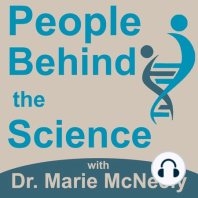32 min listen

538: Finding Out How the Brain Controls Movement in Moths During Flight - Dr. Simon Sponberg
538: Finding Out How the Brain Controls Movement in Moths During Flight - Dr. Simon Sponberg
ratings:
Length:
54 minutes
Released:
Jan 27, 2020
Format:
Podcast episode
Description
Dr. Simon Sponberg is Dunn Family Professor and Assistant Professor in the School of Physics and the School of Biological Sciences, as well as Adjunct Assistant Professor in Biomedical Engineering at the Georgia Institute of Technology (Georgia Tech). Through his research, Simon is interested in understanding how the brain works with muscles to make bodies move. Animals move gracefully in nearly all environments on Earth, and many types of movement can be difficult to perform in robotics and other created systems. Simon uses animal models to study how the body and the muscles inform the brain in terms of the information we take in and how we react to the environment. He received his B.A. in physics and biology from Lewis & Clark College and his Ph.D. in Integrative Biology from the University of California, Berkeley. Afterwards, Simon conducted postdoctoral research at the University of Washington before joining the faculty at Georgia Tech. He has been the recipient of an NSF Postdoctoral Fellowship in Biological Informatics, the University of Washington Postdoctoral Mentoring Award, the Young Investigator Award from the International Society for Neuroethology, an NSF Faculty Early Career Development (CAREER) Award, a Klingenstein-Simons Fellowship in the Neurosciences, and a Hertz Fellowship. In our interview, Simon shares more about his life and science.
Released:
Jan 27, 2020
Format:
Podcast episode
Titles in the series (100)
010: Finding Calm in the World of Stress Research - Dr. Julie Brefczynski-Lewis: Dr. Julie Brefczynski-Lewis is a Research Assistant Professor in the Department of Physiology and Pharmacology at West Virginia University. She received her PhD in Cell Biology, Neurobiology, and anatomy from the Medical College of Wisconsin. She then... by People Behind the Science Podcast - Stories from Scientists about Science, Life, Research, and Science Careers